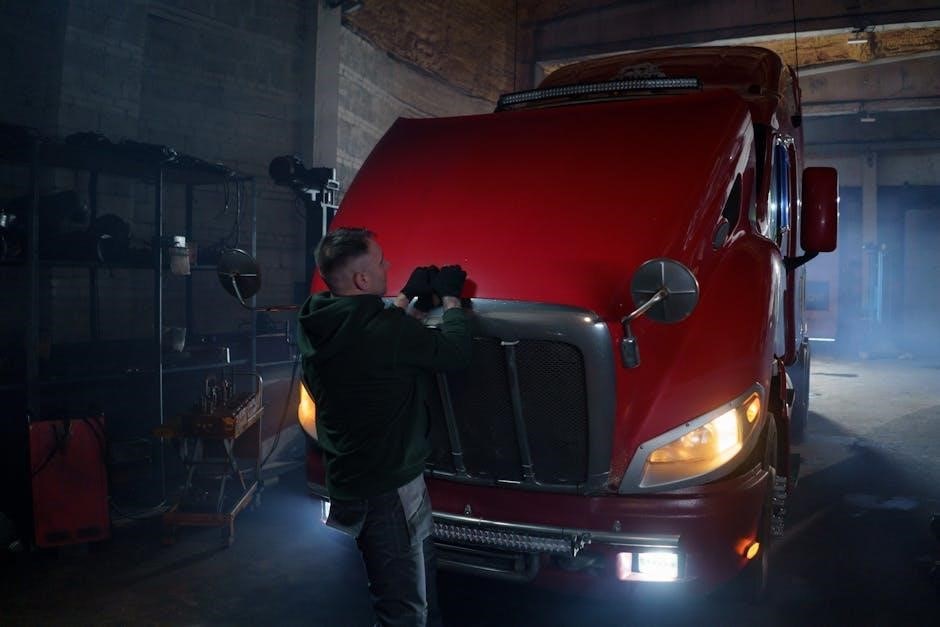The Michigan CDL Manual is a comprehensive guide for commercial drivers‚ detailing state and federal regulations‚ safety practices‚ and licensing requirements to ensure safe and efficient operations․
Overview of the CDL Program in Michigan
The Michigan CDL program ensures commercial drivers meet federal and state safety standards․ It outlines licensing requirements‚ including classification of vehicles‚ endorsements‚ and medical certifications․ The program is designed to improve road safety and efficiency‚ providing detailed guidelines for drivers to operate commercial vehicles legally and responsibly․ It aligns with national regulations while addressing Michigan-specific driving conditions and industry needs․
Importance of the CDL Manual for Commercial Drivers
The Michigan CDL Manual is essential for commercial drivers to understand state and federal regulations‚ safety protocols‚ and licensing requirements․ It serves as a primary study resource for CDL exams‚ ensuring drivers are well-prepared to operate safely and efficiently․ The manual covers critical topics such as vehicle inspections‚ defensive driving‚ and cargo handling‚ making it indispensable for both new and experienced drivers seeking to maintain compliance and proficiency․

CDL Classification and Types
The Michigan CDL classification includes Class A‚ B‚ and C licenses‚ each requiring specific endorsements and catering to different types of commercial vehicles and operations․
Class A‚ B‚ and C CDLs Explained
In Michigan‚ Class A CDLs cover combination vehicles with a GVWR of 26‚001 lbs or more‚ including trailers․ Class B licenses are for heavy straight trucks‚ while Class C is for small passenger vehicles or hazardous materials․ Each class requires specific knowledge and skills‚ ensuring drivers are qualified for their vehicle type and operational needs‚ enhancing road safety and efficiency․
Endorsements and Restrictions for Commercial Vehicles
Endorsements enhance a CDL’s privileges‚ such as H for hazardous materials or N for tankers․ Restrictions limit operations‚ like E for automatic transmissions․ Proper documentation and exams are required to add endorsements‚ ensuring compliance with safety standards; Drivers must maintain these certifications to operate specialized vehicles legally in Michigan‚ adhering to federal and state regulations for public safety and efficient transport․
Eligibility Criteria for Obtaining a CDL in Michigan
To qualify for a CDL in Michigan‚ applicants must meet age requirements‚ residency rules‚ and medical certification standards․ These criteria ensure only eligible drivers operate commercial vehicles safely․
Age Requirements and Residency Rules
In Michigan‚ CDL applicants must be at least 21 years old to operate commercial vehicles across state lines․ For intrastate commerce‚ applicants can be 18 years old․ Residency is verified through documents like a Michigan driver’s license or utility bills․ These requirements ensure compliance with federal and state regulations‚ safeguarding public safety and maintaining legal standards for commercial drivers․
Medical Certification and Physical Exams
CDL applicants in Michigan must pass a physical exam and provide a Medical Examiner’s Certificate․ The medical certification is valid for up to two years․ If a driver fails to submit this certification or meet federal standards‚ they may lose their CMV privileges․ This ensures commercial drivers meet health requirements to operate safely․ The certification process is detailed in the Michigan CDL Manual․

The CDL Application Process
Applying for a CDL in Michigan involves submitting an application‚ providing required documents‚ passing knowledge and skills tests‚ and paying the necessary fees․ The manual guides this process․
Steps to Apply for a Commercial Driver License
To apply for a CDL in Michigan‚ complete the application form‚ provide proof of residency and identity‚ submit medical certification‚ pay the required fees‚ and pass both the knowledge and skills tests․ The manual outlines these steps in detail to ensure a smooth process for applicants․
Required Documents and Fees
Applicants must provide proof of identity‚ residency‚ and medical certification․ Fees include the CDL application‚ knowledge test‚ skills test‚ and license issuance․ The manual details the required documents and current fee structure to help applicants prepare and complete the process efficiently without delays․

Study Materials and Resources
The Michigan CDL Manual serves as the primary study resource‚ covering essential topics like safety‚ vehicle inspections‚ and endorsements․ Additional materials include practice tests and online guides to aid preparation․
Sections of the Michigan CDL Manual
The Michigan CDL Manual is divided into several sections‚ each addressing specific areas of commercial driving․ These include introduction to the CDL program‚ driving safely‚ vehicle inspections‚ transporting cargo‚ endorsements‚ and state and federal regulations․ Each section provides detailed information to help drivers prepare for exams and understand their responsibilities․
Additional Study Guides and Practice Tests
Beyond the manual‚ Michigan offers interactive study guides‚ online practice tests‚ and AI-driven resources to aid CDL preparation․ These tools provide real-time feedback‚ audio learning options‚ and tailored study plans․ Practice tests mimic actual exam formats‚ covering general knowledge‚ endorsements‚ and state-specific rules․ These resources complement the manual‚ ensuring comprehensive preparation for both written and practical exams;
CDL Testing and Examinations
Michigan’s CDL testing includes written knowledge exams‚ practical skills assessments‚ pre-trip inspections‚ and driving evaluations to ensure driver competence and safety on the road․
Knowledge Tests and Skills Assessments
The CDL knowledge tests evaluate understanding of traffic laws‚ safety protocols‚ and vehicle operations․ Skills assessments include pre-trip inspections‚ basic vehicle control‚ and on-road driving to demonstrate practical competence․ Both are mandatory for obtaining a CDL‚ ensuring drivers can operate commercial vehicles safely and efficiently․ The Michigan CDL Manual provides detailed study material to prepare for these exams‚ covering topics like air brakes‚ combination vehicles‚ and hazmat transport․ Passing these assessments is essential for licensing․
Pre-Trip Inspection and Driving Test Requirements
The pre-trip inspection ensures the vehicle is roadworthy‚ checking brakes‚ tires‚ lights‚ and fluid levels․ The driving test assesses ability to safely maneuver‚ including starting‚ stopping‚ and turning․ Both steps are critical to obtaining a CDL‚ as they verify a driver’s readiness to operate a commercial vehicle safely and effectively‚ adhering to Michigan’s rigorous standards for professional drivers․ Proper preparation using the manual is essential for success․
Safe Driving Practices
Safe driving practices are essential for commercial drivers‚ emphasizing defensive techniques‚ speed management‚ and adherence to traffic laws․ The manual highlights the importance of maintaining situational awareness and proper following distances to prevent accidents and ensure public safety on Michigan roads․
Defensive Driving Techniques
Defensive driving techniques are crucial for commercial drivers to anticipate and react to potential hazards․ The Michigan CDL manual emphasizes maintaining a safe following distance‚ scanning the road ahead‚ and being prepared for unexpected actions by other drivers․ These practices help reduce accidents and enhance overall road safety‚ ensuring compliance with state and federal driving regulations․
Handling Emergency Situations on the Road
Handling emergencies on the road requires quick thinking and proper training․ The Michigan CDL manual outlines procedures for breakdowns‚ accidents‚ and medical emergencies․ Drivers should stay calm‚ secure their vehicle‚ and notify authorities if needed․ Carrying an emergency kit and knowing basic first aid is essential․ Proper training ensures commercial drivers can manage crises effectively‚ minimizing risks and ensuring safety for everyone involved․

Vehicle Inspection and Maintenance
Regular inspections and proper maintenance are critical for vehicle safety․ Drivers must check tires‚ brakes‚ and lights before and after trips to ensure compliance and safety․
Pre-Trip and Post-Trip Inspection Procedures
Pre-trip inspections ensure vehicle safety by checking tires‚ brakes‚ lights‚ and fluid levels․ Post-trip inspections review the vehicle’s condition after driving․ Both steps are critical for compliance and identifying potential issues before they lead to breakdowns or safety hazards․ Regular inspections help maintain roadworthiness and prevent violations‚ ensuring safe and efficient commercial vehicle operations in Michigan․
Understanding Vehicle Safety Regulations
Understanding vehicle safety regulations is crucial for complying with state and federal laws․ Michigan requires strict adherence to inspection standards‚ cargo securement‚ and weight limits․ Drivers must familiarize themselves with regulations regarding hazardous materials‚ hours of service‚ and emergency procedures․ Compliance ensures public safety‚ prevents violations‚ and maintains operational efficiency for commercial vehicles on Michigan roads․
Endorsements and Special Certifications
Endorsements and special certifications expand a CDL holder’s privileges‚ requiring specific tests and training‚ such as Hazmat‚ Tanker‚ and School Bus‚ to ensure specialized operations safety․
Hazmat‚ Tanker‚ and Double/Triple Trailer Endorsements
These special endorsements require additional testing and training․ Hazmat endorsement involves handling hazardous materials‚ requiring a background check and specific exam․ Tanker endorsement covers liquid cargo‚ needing a skills test․ Double/triple trailer certification allows towing multiple trailers‚ demanding precise vehicle control․ Each endorsement ensures drivers can safely manage specialized cargo and vehicles‚ adhering to federal and state regulations for public safety․
Special Requirements for School Bus and Passenger Vehicles
Operating school buses and passenger vehicles requires specific endorsements․ School bus drivers must pass a background check‚ complete a skills test‚ and attend safety training․ Passenger vehicle drivers need proper endorsements for vehicles carrying 16+ passengers․ Both require adherence to strict safety regulations‚ including pre-trip inspections and passenger safety protocols․ These endorsements ensure the safe transportation of vulnerable populations and large groups․
Regulations and Compliance
Adherence to federal and state laws is crucial for commercial drivers․ This includes hours of service‚ weight restrictions‚ and safety standards to ensure safe and legal operations․
Federal and State Laws Governing Commercial Driving
Commercial drivers in Michigan must comply with both federal and state laws․ The Federal Motor Carrier Safety Administration (FMCSA) regulates hours of service‚ vehicle standards‚ and driver qualifications․ Michigan state laws further specify requirements for CDL holders‚ including vehicle inspections‚ weight restrictions‚ and traffic violations․ Understanding these regulations is essential to maintain compliance and ensure safe‚ legal operations on public roads․
Hours of Service and Weight Restrictions
Commercial drivers in Michigan must adhere to strict hours of service regulations‚ limiting driving time to 11 hours within a 14-hour window‚ with mandatory 30-minute breaks․ Weight restrictions are enforced based on vehicle type‚ with fines for exceeding Gross Vehicle Weight Ratings (GVWR)․ Overweight permits are required for loads exceeding legal limits‚ ensuring road safety and infrastructure protection․ Compliance is critical to avoid penalties and maintain public safety․

Maintaining Your CDL
Maintaining your CDL requires regular medical certificate renewal and updates to ensure compliance with federal and state regulations․ Staying informed about license renewal processes and record-keeping is essential․
Medical Certificate Renewal and Updates
Medical certification is crucial for maintaining a valid CDL․ Drivers must renew their medical certificate periodically‚ with durations varying up to two years․ Failing to submit a valid Medical Examiner’s Certificate may result in CDL downgrading․ Regular physical exams ensure compliance with federal regulations‚ keeping commercial drivers safe and legally permitted to operate CMVs․ Updates must be filed promptly to avoid license restrictions or suspension․
License Renewal Process andKeeping Records Up-to-Date
License Renewal Process and Keeping Records Up-to-Date
Renewing a CDL in Michigan requires periodic updates and documentation․ Drivers must submit a completed renewal application‚ applicable fees‚ and updated medical certificates․ Keeping records current ensures compliance with state and federal regulations․ Accurate documentation of endorsements‚ medical certifications‚ and training is essential․ Failure to maintain up-to-date records may result in license suspension or additional penalties‚ emphasizing the importance of timely renewals and organized record-keeping․

